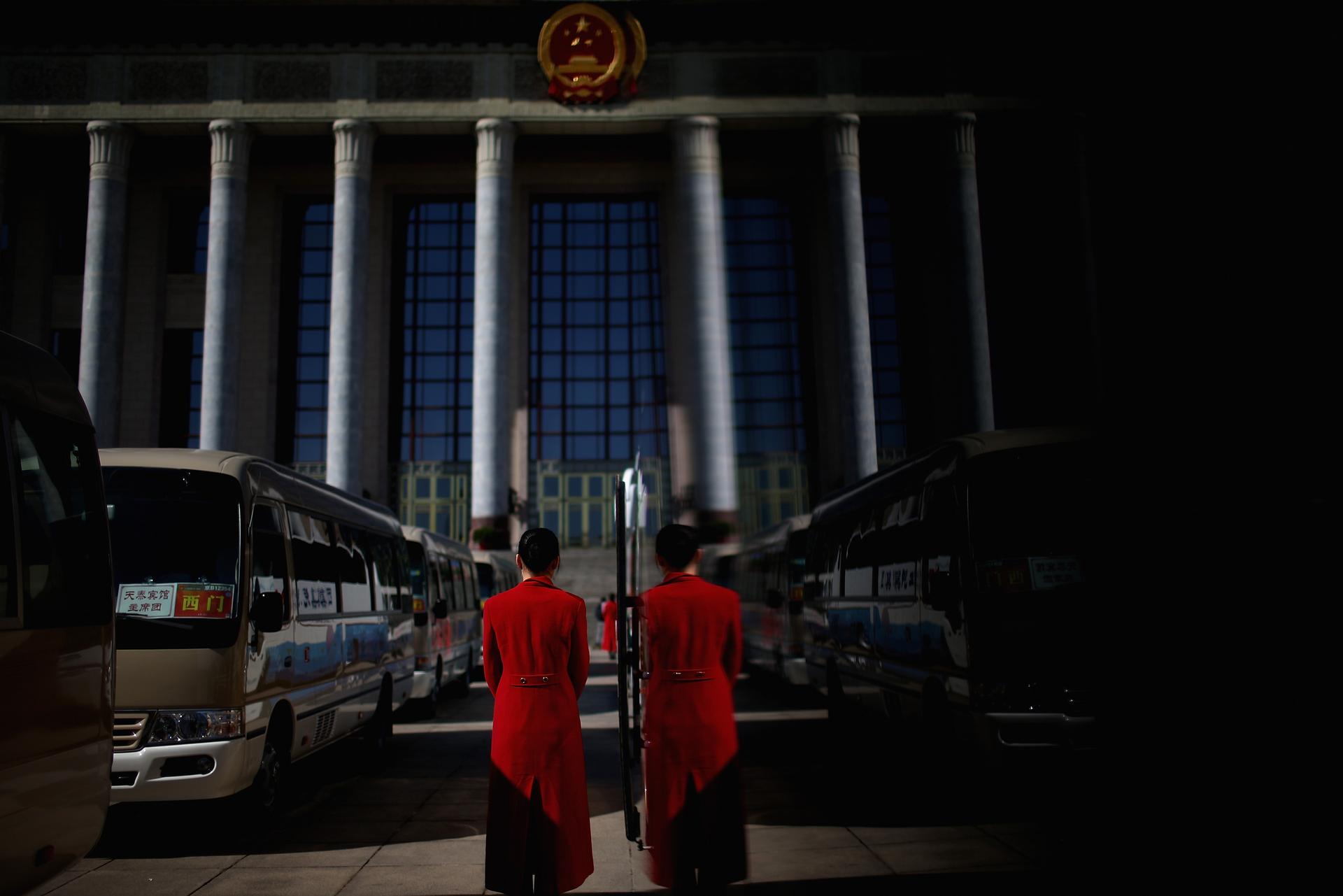China’s rubber-stamp National People’s Congress set to begin in Beijing
Hotel guide for delegates waits outside Beijing’s Great Hall of the People after a pre-opening session of the National People’s Congress, China’s parliament, on March 4, 2013.
HONG KONG — All eyes in China are on the delegates gathering in Beijing for the Tuesday opening of the National People’s Congress, which will occupy the next two weeks in China.
Analysts will be watching closely for any signs of change emanating from the Congress, which is theoretically an independent arm of the Chinese government, but which in reality simply is a rubber-stamping body that approves whatever’s been handed down from on high.
Nearly 3,000 delegates from all across China come to Beijing for the 10-day annual meeting, which in Chinese is called Lianghui, or “Two Sessions,” because it coincides with the meeting of the Chinese People's Political Consultative Conference (CPPCC), an essentially powerless, advisory body composed of Communist Party members and prominent citizens.
CPPCC delegates this year include Yao Ming, the basketball star, kung fu star Jackie Chan and Nobel laureate Mo Yan.
The CPPCC, which began on Sunday, has already seen some notable proposals.
Spotlight-loving millionaire Chen Guangbiao called for lifting the one-child policy for college graduates. People with fewer than nine years of schooling should be denied the right to have children at all, he said.
This year’s congress is seen as particularly important as it marks the formal beginning of President Xi Jinping’s administration, and it will set the tone and agenda for his first year in power.
On Monday, National People's Congress spokeswoman and vice foreign minister Fu Ying held a press conference with foreign media that was unusually short on details.
Most notably, she broke with precedent and refused to say what China’s military budget was for the year. (The figure will released with the total budget on Tuesday, however.)
At times her longwinded response sounded almost prickly.
“Every year we have to explain to the world why China has to strengthen its national defense and increase our spending,” she said. “China is such a big country, if it cannot defend itself, it will not be good for the country or the world. In its history it was bullied by others and for Chinese people such memories are deeply ingrained in our minds.”
When asked about the Senkaku/Diaoyu islands dispute with Japan, she said that it was “difficult for outsiders to understand China” and explained that while foreign media may see China as being too assertive toward its neighbors, Chinese domestic media think China is not tough enough.
“If one side takes a tough stance and abandons its commitments, then as we in China say, we need to reciprocate, otherwise it is not polite,” she said with a smile.
Top issues expected to be on the congress agenda include corruption, education and the environment.
Chinese people online are already eagerly debating the congress, with 58,000 making their pitches for new policies under the hashtag, “My proposal for the Two Sessions.”
Wang Ran, founder of the investment bank China eCapital, generated over 6,500 responses with a post outlining his vision for the congress. In its broadness and idealism it reflects the urgent mood for reform among many Chinese as Xi Jinping takes the helm.
“I think if this year's Two Sessions representatives can get the firepower to propose these four things, it will make a huge contribution to China,” he wrote.
“1.) Safety in China — not to let unscrupulous businessmen poison the air, water, and food. 2.) Rule of law — not the rule of senior officials' whims and a malleable judiciary. 3.) Freedom in China — not the trimming of news, public opinion, and free creativity by censors. 4.) China's market — not letting idle hands constantly manipulate the market economy.”
We want to hear your feedback so we can keep improving our website, theworld.org. Please fill out this quick survey and let us know your thoughts (your answers will be anonymous). Thanks for your time!
